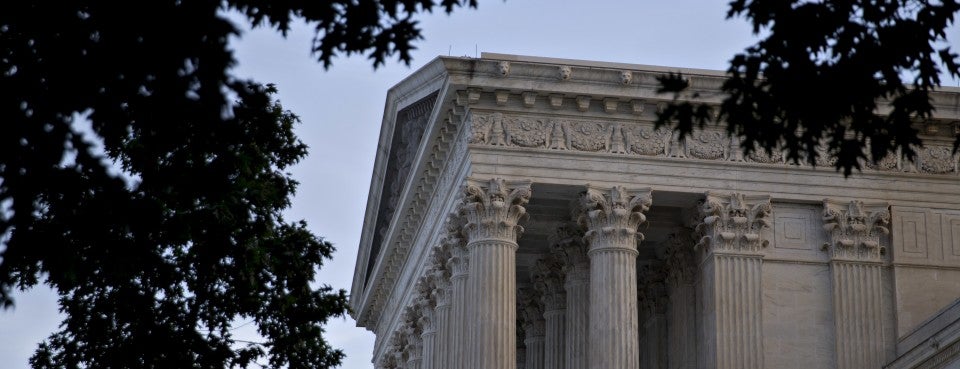via Bloomberg Law
by Jordan S. Rubin

The U.S. Supreme Court stands in Washington, D.C., on Oct. 9, 2018.
Photographer: Andrew Harrer/Bloomberg via Getty Images
Georgia lost a close U.S. Supreme Court case over the state’s ability to copyright its annotated legal code, in a ruling heralded by public access advocates over dissent that lamented its disruptive impact on states’ existing business arrangements.
Copyright protection doesn’t extend to annotations in the state’s official annotated code, Chief Justice John Roberts wrote for a 5-4 majority on Monday that crossed ideological lines. Justices Sonia Sotomayor, Elena Kagan, Neil Gorsuch, and Brett Kavanaugh joined Roberts.
The high court clarified the scope of the “government edicts doctrine,” which had previously barred copyright in materials created by judges.
The doctrine’s logic also applies to materials created by legislatures, Roberts wrote. Because Georgia’s annotations are authored by an arm of the legislature in the course of its official duties, the doctrine bars copyright here, too.
The “animating principle” behind the doctrine, Roberts wrote, “is that no one can own the law.”
Public.Resource.Org, the pro-access organization that won the dispute, is pleased that the court “rejected the possibility that a full understanding of the law could be made available only to those who can afford to pay for ‘first-class’ access,” said Goldstein & Russell’s Eric Citron, who represented the group. He said they’re looking forward to helping states expand access to their legal codes and they hope this leads to greater public engagement with the law.
It’s an important ruling not just for copyright law but for civil liberties, said Ropes and Gray’s Marta Belcher. She was lead counsel on a brief supporting the access group, filed on behalf of the Center for Democracy and Technology and the Cato Institute.
The decision is “great news for those who want to publish, comment on, or build on the law,” added Kendra Albert, clinical instructor at the Harvard Cyberlaw Clinic, which also supported Public Resource in a high court brief, on behalf of Caselaw Access Project. “The Supreme Court’s adoption of a bright line rule that the legislators’ works are uncopyrightable will help ensure that the law is accessible in a variety of formats and mediums.”
The state warned at oral argument in December that a ruling against it would “blow up” not only Georgia’s copyright regime but ones in about a third of the states with similar setups.
Indeed, the ruling “will likely come as a shock to the 25 other jurisdictions—22 States, 2 Territories, and the District of Columbia—that rely on arrangements similar to Georgia’s to produce annotated codes,” Justice Clarence Thomas wrote in a dissent joined by Justice Samuel Alito and partially by Justice Stephen Breyer. Justice Ruth Bader Ginsburg wrote her own dissent, joined by Breyer.
The decision “clearly will disrupt or upend the relationship between states and the people they work with to create commentary on the codes,” said intellectual property litigator B. Brett Heavner, a partner at Finnegan.
“As Justice Thomas—joined by Justices Breyer and Alito—explained in citing Arkansas’s multistate brief and dissenting from today’s decision, the majority’s decision will come as a surprise to the 25 jurisdictions that no longer enjoy protection,” said Arkansas Attorney General Leslie Rutledge. She led a coalition of states supporting Georgia.
Georgia’s lawyer, Joshua Johnson of Vinson & Elkins, didn’t immediately respond to a request for comment on the ruling.
Economy Class, First Class
The copyright clash stemmed from Georgia’s suit against Public Resource.
The state’s annotated legal code is produced by private company LexisNexis Group, pursuant to an agreement with the state that gives the company exclusive publication rights. But Georgia claims the copyright and sued Public Resource for infringement when the non-profit tried to publish the code on its own.
There would have been nothing to argue about if it were only the statutes at stake, because the government edicts doctrine would have clearly barred the state’s claim.
But the annotations, which includes things like commentaries, case notations, and editor’s notes, don’t have the force of law.
That raised tricky questions for the justices about how to apply the doctrine here. In a divided ruling, the high court sided against the state, citing the Georgia legislature’s involvement.
The annotated code is assembled by a state entity composed mostly of legislators, funded through legislative appropriations, and staffed by a legislative office, Roberts noted in deeming the annotations beyond the reach of copyright protections. The ruling upheld a federal appeals court decision against the state, but under different reasoning.
Erik Stallman, associate director of the Samuelson Law, Technology & Public Policy Clinic at Berkeley Law, said the decision “results in a clearer articulation of the doctrine’s scope than the lower court’s three-part test: copyright cannot vest in works that are created by judges and legislators in the course of their judicial and legislative duties. Full stop.” The clinic filed a brief supporting Public Resource, on behalf of library groups,
The majority, Stallman said, “seemed genuinely concerned about a scenario in which the public has access only to the ‘economy class’ version of the Georgia Code, with only the bare statutory text, while the ‘first class’ version that explains what statutes are still in force and how they should be interpreted would be available only to paying customers.”
Filed in: In the News, Uncategorized OCP
Tags: Cyberlaw Clinic, Kendra Albert
Contact Office of Clinical and Pro Bono Programs
Website:
hls.harvard.edu/clinics
Email:
clinical@law.harvard.edu